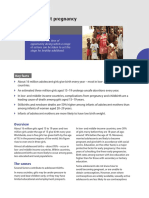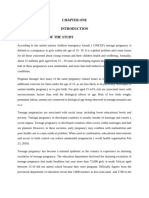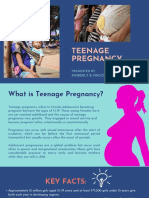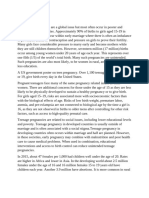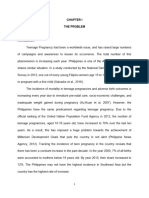Aaa SN Psyc
Aaa SN Psyc
Uploaded by
kingawesome21Copyright:
Available Formats
Aaa SN Psyc
Aaa SN Psyc
Uploaded by
kingawesome21Original Title
Copyright
Available Formats
Share this document
Did you find this document useful?
Is this content inappropriate?
Copyright:
Available Formats
Aaa SN Psyc
Aaa SN Psyc
Uploaded by
kingawesome21Copyright:
Available Formats
Jenny Rose Vioya BSN IV-2
Teenage pregnancy is pregnancy in a female under the age of 20 (when the pregnancy ends). A pregnancy can take place as early as two weeks before menarche (the first menstrual period), which signals the possibility of fertility, but usually occurs after menarche. In healthy, well-nourished girls, menarche normally takes place around the ages 12 or 13. Whether the onset of biological fertility will result in a teenage pregnancy depends on a number of personal and societal factors. Teenage pregnancy rates vary between countries because of differences in levels of sexual activity, general sex education provided and access to affordable contraceptive options. Pregnant teenagers face many of the same obstetrics issues as women in their 20s and 30s. There are however, additional medical concerns for mothers younger than 15. For mothers between 15 and 19, risks are associated more with socioeconomic factors than with the biological effects of age. However, research has shown that the risk of low birth weight is connected to the biological age itself, as it was observed in teen births even after controlling for other risk factors (such as utilization of antenatal care etc.). In developed countries, teenage pregnancies are associated with many social issues, including lower educational levels, higher rates of poverty, and other poorer life outcomes in children of teenage mothers. Teenage pregnancy in developed countries is usually outside of marriage, and carries a social stigma in many communities and cultures. Epidemiology 13 million children are born to women under age 20 worldwide 90% of these births occur to women living in developing countries Complications of pregnancy and childbirth are the leading cause of mortality among women between the ages of 15 and 19 Asia have shown a trend towards increasing age at marriage for both sexes Singapore, Japan and Korea have a 2.9 percent of teenage pregnancy a lowest percentage in asia but have a significant increase in pre-marital sex among youth Thailand, Indonesia, Philippines and Bangladesh have a a ratio of teenage pregnancy of 60 out of 1000. It was attributed to increase of prostitution, socioeconomic problems and lack of education 26-37% of teenage mother died in 2010 due to maternal causes Teenage Pregnancy in the Philippines Philippines has the highest rate of teenage pregnancies among youths aged 15 to 19 compared to the other neighboring countries in the Asia Pacific that have a better record of 34 births per 1,000 women. According to the National Demographic and Health survey for 2008, 10 percent of the countrys girls aged 15 to 19 become pregnant with their first child. The United Nations Population Fund (UNFP), in its 20011 report, also revealed that out of 1000 women, there were 53 births recorded from women of the said ages. The same organization also reported that government statistics on female adolescent pregnancies indicate that the total number of annual births changed little over the preceding 10 years, but the number of teenage pregnancies increased by 70 percent in just one decade at a count of 114,205 in 1999 to 195,662 in 2009. teen pregnancy concern, if not given focus, can derail and affect the country's program targets with respect to its Millennium Development Goals (MDGs). in the Cordillera, 13.9% of the girls have premarital sex with the mean age of 18 when they have their first encounter of sex. Additional information from the said survey also reveal that 92.3% of these girls have sex with their boyfriends or their ka-on. Surprisingly also, it was revealed that 43.8% did not plan to have a sexual experience but such happened anyway while 25% of those who have sex at said age for the first time did not want to do it but went along with it. Causes of Teenage Pregnancy In some societies, early marriage and traditional gender roles are important factors in the rate of teenage pregnancy. For example, in some subSaharan African countries, early pregnancy is often seen as a blessing because it is proof of the young woman's fertility. The average marriage age differs by country, and in countries where teenage marriages are common, one can expect to also experience higher levels of teenage pregnancies. In the Indian subcontinent, early marriage and pregnancy is more common in traditional rural communities compared to the rate in cities. The lack of education on safe sex, whether it is from parents, schools, or otherwise, is a cause of teenage pregnancy. Many teenagers are not taught about methods of birth control and how to deal with peers who pressure them into having sex before they are ready. Many pregnant teenagers do not have any cognition of the central facts of sexuality. Some teenage girls have said to be pressured into having sex with their boyfriends at a young age, and yet no one taught teens how to deal with this pressure or to say "no". In societies where adolescent marriage is less common, such as many developed countries, young age at first intercourse and lack of use of contraceptive methods (or their inconsistent and/or incorrect use; the use of a method with a high failure rate is also a problem) may be factors in teen pregnancy. Most teenage pregnancies in the developed world appear to be unplanned. In an attempt to reverse the increasing numbers of teenage pregnancies, governments in many Western countries have instituted sex education programs, the main objective of which is to reduce such pregnancies and STDs. Countries with low levels of teenagers giving birth accept sexual relationships among teenagers and provide comprehensive and balanced information about sexuality.
Prevention Many health educators have argued that comprehensive sex education would effectively reduce the number of teenage pregnancies, although opponents argue that such education encourages more and earlier sexual activity.
Source: http://www.rappler.com/move-ph/12463-an-urgent-response-needed-to-address-teen-pregnancy http://www.cdc.gov/teenpregnancy/PreventTeenPreg.htm http://www.dh.gov.uk/en/Publicationsandstatistics/Publications/PublicationsLibrary/Publicationslibrarysearchresults/index.htm?searchTerms=Teenage%20pregnancy http://www.who.int/mediacentre/multimedia/podcasts/2009/teenage-pregnancy-20090213/en/index.html http://www.sunstar.com.ph/baguio/feature/2012/06/28/more-teens-becoming-moms-229120 http://www.interaksyon.com/article/30434/teenage-pregnancies-in-philippines-rise-70-percent-over-10-years---unfpa
http://www.rappler.com/move-ph/12463-an-urgent-response-needed-to-address-teen-pregnancy
You might also like
- NCP & FdarDocument3 pagesNCP & Fdarkingawesome21100% (1)
- Adolescent PregnancyDocument24 pagesAdolescent PregnancyKyler DarkNo ratings yet
- Situation AnalysisDocument8 pagesSituation AnalysisKeena Joy Awisan - Pinas100% (1)
- Teenage Pregnancy Is Not A BlessingDocument15 pagesTeenage Pregnancy Is Not A BlessingEryll Eunice VillaganasNo ratings yet
- Review of Literature Teenage Pregnancy StatisticsDocument10 pagesReview of Literature Teenage Pregnancy StatisticsDy Ju Arug ALNo ratings yet
- RRL FinalDocument7 pagesRRL FinalBRIGINO, ALYSSA BERNICE I.No ratings yet
- Chapter 2Document7 pagesChapter 2angeline_letran91% (11)
- A Study On The Problem of Teenage PregnancyDocument37 pagesA Study On The Problem of Teenage PregnancyujranchamanNo ratings yet
- Reflection Paper On Teenage PregnancyDocument6 pagesReflection Paper On Teenage PregnancyEdcelle Bimbo50% (2)
- Midterm Examination in Purposive Communication: Name: Philipp Louie G. Cabarrubias Year/Section: BSMT-1 GolfDocument4 pagesMidterm Examination in Purposive Communication: Name: Philipp Louie G. Cabarrubias Year/Section: BSMT-1 GolfYoj EscarioNo ratings yet
- WHO RHR 14.08 EngDocument4 pagesWHO RHR 14.08 EngAkebu LubasiNo ratings yet
- Teenage PregnancyDocument2 pagesTeenage Pregnancyliah rie mendozaNo ratings yet
- Teenage PregnancyDocument3 pagesTeenage PregnancyCherrylou Buday100% (1)
- PR2 Group1Document2 pagesPR2 Group1Dwcb HS RegistrarNo ratings yet
- Gimba ShilatuDocument13 pagesGimba Shilatustephenemmanuel2347No ratings yet
- Adolescent Pregnancy: Many Adolescent Girls Between 15 and 19 Get PregnantDocument3 pagesAdolescent Pregnancy: Many Adolescent Girls Between 15 and 19 Get PregnantladyanjaniNo ratings yet
- Research PapertDocument9 pagesResearch Papertjethro sasiNo ratings yet
- Teenage PregnancyDocument5 pagesTeenage PregnancyLyrehc AblasiNo ratings yet
- Chapter 2 MethologyDocument17 pagesChapter 2 MethologyTrisha Mae SamasNo ratings yet
- Teenage PregnancyDocument1 pageTeenage PregnancyGilbertNo ratings yet
- Sex Educ and Teen PregnancyDocument10 pagesSex Educ and Teen PregnancyBoy Kakak Toki0% (1)
- FINAL PAPER_TEENAGE PREGNANCY_STEM11J_BUGTAI,RAGASAJO,SUELLODocument16 pagesFINAL PAPER_TEENAGE PREGNANCY_STEM11J_BUGTAI,RAGASAJO,SUELLO24800184No ratings yet
- Teenage PregnancyDocument2 pagesTeenage PregnancyGina Arcala LinNo ratings yet
- Adolescent Pregnacy, Unwed Mother, Sexual Violence - 3rd BSC 2014Document236 pagesAdolescent Pregnacy, Unwed Mother, Sexual Violence - 3rd BSC 2014sindhujojo0% (1)
- Teenage PregnancyDocument12 pagesTeenage PregnancyMaebelle Tambo-ongNo ratings yet
- Thesis in EnglishDocument7 pagesThesis in EnglishYohanNo ratings yet
- Aspectos SocialesDocument4 pagesAspectos SocialesGuru RachellNo ratings yet
- Teenage Pregnancy: Kimberly B. NacionDocument19 pagesTeenage Pregnancy: Kimberly B. NacionKim Nacion100% (4)
- Practical Research 1Document6 pagesPractical Research 1Dimple JsjsjNo ratings yet
- Position Paper On Teenage PregnancyDocument3 pagesPosition Paper On Teenage PregnancyMark Anthony Cabangon0% (1)
- Chapter 2 For Final PrintingDocument23 pagesChapter 2 For Final PrintingfreyNo ratings yet
- Teenage PregnancyDocument20 pagesTeenage PregnancyRaniel John Avila Sampiano100% (2)
- PregnantDocument10 pagesPregnantm.sandra12340No ratings yet
- Sample Research Introduction On Teen PregnancyDocument12 pagesSample Research Introduction On Teen PregnancyMARY ANGELICA AQUINONo ratings yet
- Adolescent PregnancyDocument3 pagesAdolescent PregnancyjaphetnwapiNo ratings yet
- INTRODUCTION Teenage Pregnancy - Docx MilynDocument2 pagesINTRODUCTION Teenage Pregnancy - Docx Milynprince4hircs4christi100% (7)
- Chapter 1Document10 pagesChapter 1Jonathan Delos Reyes100% (2)
- Practical Research 2Document18 pagesPractical Research 2Maryrose TrajeBarroNo ratings yet
- Chapter 1Document4 pagesChapter 1Faisal Tuazon IINo ratings yet
- TEENAGE PREGNAN-WPS OfficeDocument13 pagesTEENAGE PREGNAN-WPS OfficeTemitope AkinyeleNo ratings yet
- Lived Experiences of Teenage Chapter 1Document9 pagesLived Experiences of Teenage Chapter 1Bella Marquez100% (3)
- Joys and Challenges of Teen PregnancyDocument11 pagesJoys and Challenges of Teen PregnancyMicheal LezondraNo ratings yet
- What Is Teenage PregnancyDocument1 pageWhat Is Teenage PregnancyCjay Hernandez100% (1)
- Teenage PregnancyDocument7 pagesTeenage PregnancyRuzzel Mae Saile CodillaNo ratings yet
- PregnancyDocument13 pagesPregnancyOnyishi BlessingNo ratings yet
- Teenage Pregnancy in The PhilippinesDocument7 pagesTeenage Pregnancy in The PhilippinesJanine Marie CaprichosaNo ratings yet
- Catherine ProposalDocument10 pagesCatherine ProposalAlphajor JallohNo ratings yet
- Teenage PregnancyDocument24 pagesTeenage Pregnancynievesarianne1No ratings yet
- Teenage PregnancyDocument1 pageTeenage PregnancyDiianaMorenoNo ratings yet
- Teenage PregnancyDocument27 pagesTeenage PregnancyMaricel Ceyh GonzalesNo ratings yet
- Teenage Pregnancy Is The Biggest Problem Women and Girls Face in The PhilippinesDocument3 pagesTeenage Pregnancy Is The Biggest Problem Women and Girls Face in The PhilippinesVon VeraNo ratings yet
- Peer Pressure: Sexual ViolenceDocument16 pagesPeer Pressure: Sexual ViolencePatrisha anne PaviaNo ratings yet
- Pregnancy 2 (1) .OdtDocument9 pagesPregnancy 2 (1) .Odtsonika nayarNo ratings yet
- Preventing Early Pregnancy BriefDocument8 pagesPreventing Early Pregnancy BriefGansar Budi SantosoNo ratings yet
- CounterargumentDocument3 pagesCounterargumentMango GuapoNo ratings yet
- Review of Related LiteratureDocument10 pagesReview of Related LiteratureMalariairalaMNo ratings yet
- Research Paper EARLY PREGNANCYDocument11 pagesResearch Paper EARLY PREGNANCYMaria Concepcion TuvillaNo ratings yet
- Alarmed Problem – Pregnancy in The Teenage: A Serious Crime and TragedyFrom EverandAlarmed Problem – Pregnancy in The Teenage: A Serious Crime and TragedyNo ratings yet
- Nursing TheoriesDocument5 pagesNursing TheoriesThuganamix100% (19)
- Instruction: Indicate The Appropriate Numerical Rating Using The Label BelowDocument10 pagesInstruction: Indicate The Appropriate Numerical Rating Using The Label Belowkingawesome21No ratings yet
- Stroke: Brain Attack and Acute Ischemic Cerebrovascular Syndrome (Modeled AfterDocument15 pagesStroke: Brain Attack and Acute Ischemic Cerebrovascular Syndrome (Modeled Afterkingawesome21No ratings yet
- Area Technique Normal Findings Analysis and Interpretation A. SkullDocument7 pagesArea Technique Normal Findings Analysis and Interpretation A. Skullkingawesome21100% (1)











